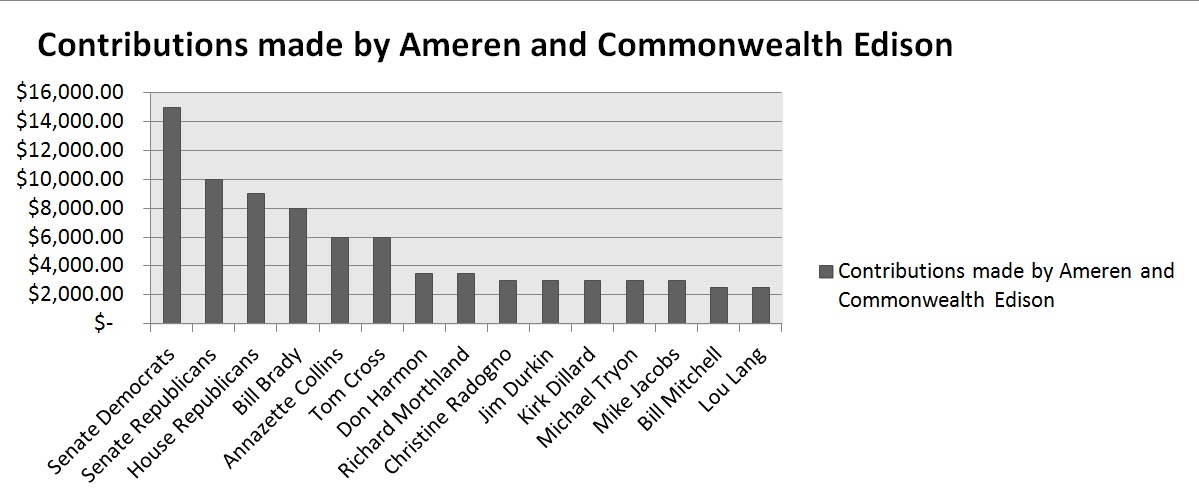By Andrew Thomason/Illinois Statehouse News
Illinois’ two largest utility providers have given $116,400 to the campaign warchests of lawmakers just weeks before the Legislature is expected to address a contentious rate-hike veto.
Gov. Pat Quinn vetoed legislation last month that would have allowed Commonwealth Edison Co. and Ameren to charge customers more to pay for statewide infrastructure upgrades.
Under this proposal, Commonwealth Edison Co. customers would have seen their bill jump by $36 a year and Ameren customers by $40 more annually.
The General Assembly likely will take up the measure when it returns here Oct. 25 during the fall veto session.
Commonwealth Edison Co. and its parent company, Exelon, and Ameren have donated to 38 legislators since Quinn’s veto Sept. 12, according to Illinois State Board of Election records.
“They are trying to reinforce positions, so they definitely give money to people that have supported them in the past. They give money to leaders, but they are also trying to influence votes,” said Kent Redfield, a professor of political science at the University of Illinois at Springfield.
 (Expand Image)
(Expand Image)
–
Nine of the 38 legislators either voted “no” or “present” on the legislation in the spring. The measure squeaked out of the General Assembly with votes of 67-47 in the House and 31-24 in the Senate. If bill proponents want to override Quinn’s veto, they need 71 votes in the House and 36 votes in the Senate.
The largest chunk of cash from the utility companies – $19,000 – went to the State Senate and House Republican caucuses. The State Senate Democratic caucus received $15,000. Caucuses can divide that money among their members to help in upcoming re-election efforts.
State Sen. Bill Brady, R-Bloomington, received a total of $8,000, the most from the two power companies in recent weeks. The former GOP gubernatorial candidate was followed by House GOP Leader Tom Cross, R-Oswego, who was given a total of $6,000 from both companies.
Cross and Brady voted for the legislation earlier this year.
Lawmakers in favor of the plan insist they want what’s best for the consumer and aren’t influenced by money.
In fact, state Sen. Mike Jacobs, D-East Moline, allegedly struck fellow Sen. Kyle McCarter, R-Lebanon, on the Senate floor during a debate, after McCarter said Jacobs’ father, Denny Jacobs, is a lobbyist for Commonwealth Edison.
Jacobs, who sponsored the legislation in the Senate, has received $3,000 from both companies since Quinn’s veto.
For his part, Jacobs said the measure is about upgrading an aging electrical grid.
“What does a utility company care if they build a new smart grid? They’re still going to have customers (if they don’t). This is going to be good for citizens, you just can’t rely on a grid that was built in the 1800s,” Jacobs said.
State Sen. Dave Luechtefeld, R-Okawville, agreed that the electrical grid needs to be modernized. However, he voted no on the original legislation. Luechtefeld has received $1,000 from Ameren since Quinn’s veto.
“When I voted that fist time I voted no and I had mixed fillings on it. I still don’t know how I’m going to vote as far as an override,” Luechtefeld said. “I can’t say there is any one thing I want changed. I can’t say anything other than (the original legislation) was too good of a deal for ComEd and Ameren.”
Luechtefeld said that Ameren’s contribution to his campaign won’t play a factor in how he votes.
Regardless of campaign donations, Redfield said there are likely to be changes to the legislation before a veto override is possible.
“Just running the same bill you’re going to get the same results. So the critical question is are you going to get a series of changes and modifications that are agreed to that will allow people who voted against the bill to vote for the override,” Redfield said.
If the measure can’t be pushed through the legislature during the fall veto session, Jacobs said he would likely reintroduce some form of the legislation in the spring.
–
See also: Special Interests Giving To Politicians Ahead Of Veto Session
–
Comments welcome.
Posted on October 19, 2011


